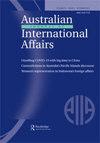The United Nations Security Council and health emergencies: introduction
IF 1.8
3区 社会学
Q2 INTERNATIONAL RELATIONS
引用次数: 0
Abstract
ABSTRACT Since 2000, health issues have increasingly been discussed at the UN Security Council (UNSC) without consensus being built on how and when the Council address health topics, or on its role in global health governance. As the contributions in this issue show, high-profile infectious disease outbreaks as well as the disruption of healthcare delivery and assistance in conflict settings have driven the health agenda at UNSC debates, but that agenda has remained ad hoc. Health topics seem most likely to be put on the agenda when the P5 perceive a particular health issue as a threat to international peace and security, or when the social and economic consequences of a health crisis potentially destabilise countries or regions. That raises another political question, however: under what circumstances are they likely to perceive health issues in those terms, and whose interests are being prioritised in such a determination?联合国安全理事会与突发卫生事件:导言
自2000年以来,联合国安理会(UNSC)对卫生问题的讨论越来越多,但对于安理会如何以及何时处理卫生议题,或其在全球卫生治理中的作用,尚未达成共识。正如本期文章所示,引人注目的传染病爆发以及冲突环境中保健服务和援助的中断推动了安理会辩论的卫生议程,但该议程仍然是临时议程。当五常认为某一特定卫生问题对国际和平与安全构成威胁,或卫生危机的社会和经济后果可能破坏国家或地区的稳定时,卫生议题似乎最有可能被列入议程。然而,这就提出了另一个政治问题:在什么情况下,他们可能从这些角度看待健康问题?在这种决定中,谁的利益被优先考虑?
本文章由计算机程序翻译,如有差异,请以英文原文为准。
求助全文
约1分钟内获得全文
求助全文
来源期刊

Australian Journal of International Affairs
INTERNATIONAL RELATIONS-
CiteScore
3.20
自引率
13.30%
发文量
44
期刊介绍:
AJIA is the journal of the Australian Institute of International Affairs. The Institute was established in 1933 as an independent and non-political body and its purpose is to stimulate interest in and understanding of international affairs among its members and the general public. The aim of the Australian Journal of International Affairs is to publish high quality scholarly research on international political, social, economic and legal issues, especially (but not exclusively) within the Asia-Pacific region. The journal publishes research articles, refereed review essays and commentary and provocation pieces. ''Articles'' are traditional scholarly articles. ‘Review essays’ use newly published books as the basis to thematically examine current events in International Relations. The journal also publishes commentaries and provocations which are high quality and engaging pieces of commentary, opinion and provocation in a variety of styles. The Australian Journal of International Affairs aims to analyse international issues for an Australian readership and to present Australian perspectives to readers in other countries. While seeking to stimulate interest in and understanding of international affairs, the journal does not seek to promote any particular policies or approaches. All suitable manuscripts submitted are sent to two referees in a full ''double blind'' refereeing process.
 求助内容:
求助内容: 应助结果提醒方式:
应助结果提醒方式:


